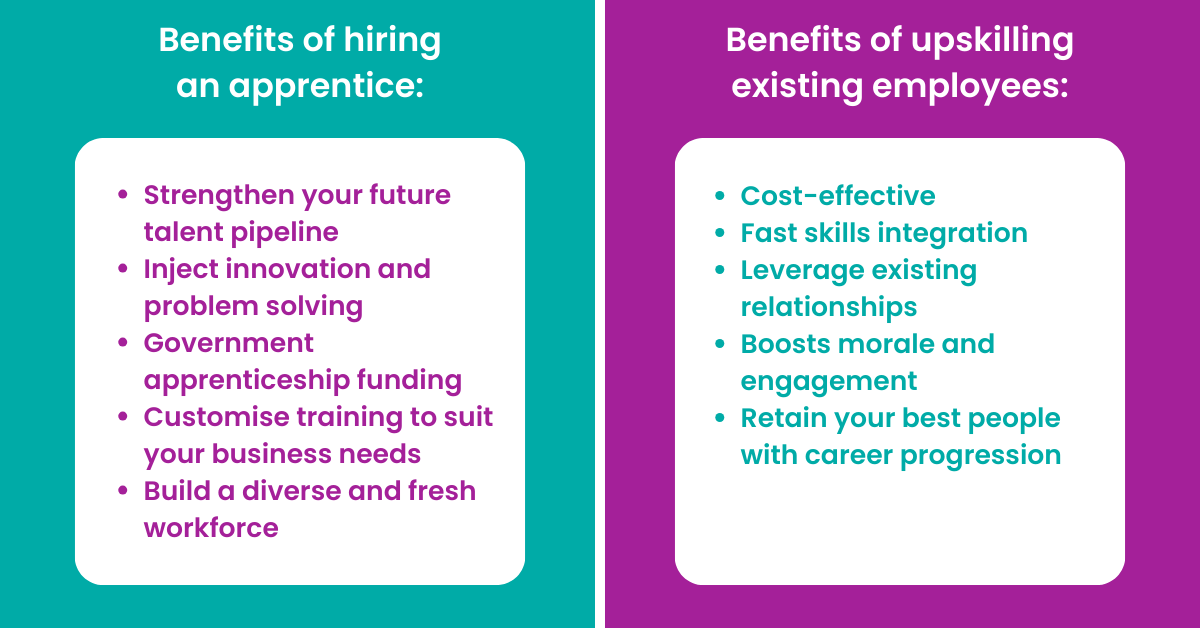- Home
- Insights
Posted 5 months ago
Upskilling vs. Hiring in the UK – What's the Smarter Move for Employers?
In today's fast-paced business landscape, staying competitive means investing in talent—whether that's bringing in fresh perspectives or nurturing the skills of your existing team.
With employers in England spending an average of £6000+ per new hire and facing a growing digital skills shortage, the smarter question isn't if they should invest in workforce development, but how to do it cost-effectively. Should you hire a new apprentice to inject energy and innovation into your business? Or is it more effective to upskill your current employees by enrolling them in an apprenticeship programme?
CT Skills offers a flexible and impactful solution for both paths, helping businesses build a stronger, more capable workforce. In this blog, we'll explore the unique benefits of each approach, and how choosing the right strategy can drive growth, improve retention, and future-proof your organisation.
Benefits of hiring an apprentice:
- Strengthen your future talent pipeline
- Inject innovation and problem solving
- Government apprenticeship funding
- Customise training to suit your business needs
- Build a diverse and fresh workforce
Hiring an apprentice offers a strategic way to fill immediate skill gaps within your team while bringing in fresh thinking and new perspectives. Apprentices often approach challenges with curiosity and creativity, which can spark innovation across the business. With government apprenticeship funding available, the financial investment is significantly reduced, making it a cost-effective way to grow your workforce.
Training can be tailored specifically to your organisation's needs, ensuring apprentices develop the exact skills required for your operations. Additionally, bringing in apprentices helps build a more diverse and dynamic workforce, contributing to a stronger, more inclusive company culture.
Employers hiring apprentices under 25 on approved programmes don't pay Class 1 secondary National Insurance contributions (up to £50,270 per year). This can significantly reduce employment costs and make apprenticeships even more cost-effective.
Visit our blog 5 Benefits of Hiring an Apprentice for Your Business.
'Having apprentices has brought real benefits to our business. They've come in with fresh perspectives and a willingness to learn from our experienced team members, while also challenging us to think differently. Their insights into current trends and views, especially those important to younger generations, have opened our eyes and helped us evolve as a business.' - Tag Sportswear
Benefits of upskilling existing employees:
- Cost-effective
- Fast skills integration
- Leverage existing relationships
- Boosts morale and engagement
- Retain your best people with career progression
Upskilling existing employees through apprenticeships is a powerful way to build internal strength and long-term resilience within an organisation. It offers a highly cost-effective approach to talent development, eliminating the need for recruitment and onboarding expenses. Employees already familiar with company systems and culture can quickly integrate new skills and apply them immediately, driving faster results. This not only enhances productivity but also strengthens internal and external relationships that are already in place.
By investing in employee growth and career progression, businesses improve retention, boost morale, and increase engagement—creating a motivated workforce that feels valued and connected to the organisation's goals. Over time, this culture of continuous learning and development builds a confident, capable team that can adapt to change, collaborate effectively, and support sustainable growth from within.
Upskilling isn't just about skills—it's about people. The 2023 Apprenticeship Evaluation found that apprenticeships are a powerful retention tool, especially when paired with career progression opportunities. This will have a huge impact on staff retention which is or will be the biggest challenge facing organisations this year.
Upskilling & digital transformation
As the UK accelerates its digital transformation, the pressure to upskill the workforce has never been greater. Emerging technologies like AI and automation are rapidly reshaping job roles, making digital literacy and technical proficiency essential across every sector, and the digital skills shortage is currently costing the UK £63 billion in lost potential GDP each year. Yet, the challenge extends beyond hard skills. Soft skills—such as communication, adaptability, and problem-solving—are proving equally vital in navigating this evolving landscape.
The risk of inaction is significant. Businesses that fail to invest in upskilling face higher employee turnover, increased recruitment costs, and missed opportunities for innovation and growth. In fact, 75% of UK employers report hiring technically skilled candidates who later underperformed due to poor soft skills and lack of cultural fit. With 50% of employees expected to require reskilling by year-end, the urgency is clear.
This is where apprenticeships and online training emerge as strategic solutions. Government-backed funding and apprenticeship programmes offer businesses the chance to tailor training to their specific needs—closing both digital and soft skills gaps. According to ThisWorks, many recent graduates lack the problem-solving, critical thinking, and tech-savviness that employers demand. Apprenticeships provide a practical alternative, enabling companies to cultivate talent that's aligned with their culture and ready to contribute from day one.
Online Courses
Looking for quick, flexible training options? CT Skills offers online courses in digital skills, leadership, customer service, and more. Perfect for busy teams who want to learn at their own pace.
'The short courses, especially the Principles in Team Leading Level 2 course is one which we have embedded into our internal management programme.'
'CT Skills' courses have increased the team members skills and knowledge which then our team members have been able to use in their roles within Alloga and in their personal lives outside of the business.' - Alloga
A combined approach
The most effective strategy? Combine both. A hybrid approach—upskilling current staff while hiring apprentices—builds a strategic pipeline solution. As highlighted by the BBC, hiring in the UK is increasingly complex. A balanced strategy helps employers stay agile and competitive and creates a flexible, future-ready workforce.
Rather than choosing between upskilling and hiring, UK employers should embrace a hybrid model:
- Upskill existing staff to boost productivity, strengthen your current team, and reduce reliance on external recruitment.
- Hire apprentices to inject fresh thinking, fill immediate gaps, and develop future leaders.
- Leverage free training and recruitment support to maximise ROI and long-term workforce resilience.
This isn't just a short-term fix—it's a long-term strategy to build a flexible, skilled, and engaged workforce. In a competitive market, that's the ultimate advantage.
To explore how our free recruitment support can save you money on hiring, contact our friendly team today.
Share this post
Get in touch with us
Use this form to send us a message, and we’ll get back to you shortly.



